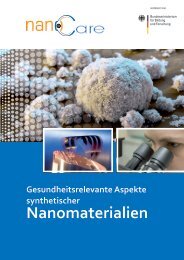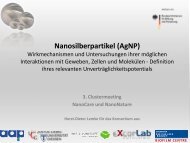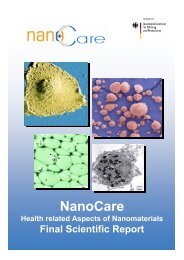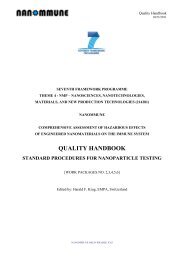Timing, hosts and locations of (grouped) events of NanoImpactNet
Timing, hosts and locations of (grouped) events of NanoImpactNet
Timing, hosts and locations of (grouped) events of NanoImpactNet
Create successful ePaper yourself
Turn your PDF publications into a flip-book with our unique Google optimized e-Paper software.
NanoSafetyCluster - Compendium 2012<br />
field <strong>and</strong> accessible national <strong>and</strong> international programmes <strong>and</strong><br />
including the OECD WPMN sponsorship programme <strong>and</strong><br />
transatlantic co-operations. Building on these inputs we will<br />
integrate into a web-based, comprehensive, searchable IT platform<br />
to create an integrated resource to bridge the gaps caused by<br />
confidentiality, delays between findings <strong>and</strong> data access <strong>and</strong><br />
limitations by search engines. Results generated within MARINA<br />
will serve to narrow the critical knowledge gaps in all <strong>of</strong> the<br />
principal areas in the risk management paradigm for ENM linking<br />
Materials, Exposure, Hazard <strong>and</strong> Risk, in order to provide an<br />
overarching underst<strong>and</strong>ing <strong>of</strong> the interaction <strong>of</strong> ENM with humans<br />
<strong>and</strong> the environment towards a sound, scientifically based,<br />
coherent approach to assessing <strong>and</strong> managing the potential risk <strong>of</strong><br />
ENM. MARINA is dedicated towards the development <strong>of</strong> validated<br />
reference methods for managing the risks <strong>of</strong> ENM <strong>and</strong> is the first<br />
project to also address monitoring <strong>of</strong> exposure <strong>of</strong> ENM <strong>and</strong> its<br />
contribution to RA <strong>and</strong> RMM. An integral part <strong>of</strong> the MARINA<br />
project is also to make available the findings <strong>and</strong> the methods to<br />
other users in an accessible format in order to maximize the<br />
benefit <strong>of</strong> the project. For support to policy <strong>and</strong> decision making<br />
concerning nanotechnology in respect to various stakeholders,<br />
MARINA will provide a unique resource <strong>of</strong> information <strong>and</strong><br />
methodology. It will support shifting from case-by-case evaluations<br />
to holistic health <strong>and</strong> environmental safety assessment <strong>and</strong><br />
management that addresses overall risks. By using frames <strong>and</strong><br />
modules <strong>of</strong> integrated testing <strong>and</strong> integrated assessment,<br />
conclusions are set in a science-policy perspective. All information<br />
is provided web-accessible in real time. Decision makers will find<br />
information directly in a format, which allows analysis across<br />
endpoints, across material types or preparation forms. Industry<br />
depends on evidence-based safety assessment to safeguard<br />
market potential <strong>and</strong> sustainability <strong>of</strong> their products. MARINA will<br />
provide the industry with important data <strong>and</strong> tools to take<br />
decisions about products, processes, risk management measures<br />
<strong>and</strong> safety assessment. This includes validation, weight <strong>of</strong> evidence<br />
approaches, expressions <strong>of</strong> uncertainties, quantitative expression<br />
<strong>of</strong> risks <strong>and</strong> setting the risk in appropriate context in e.g. risksustainability<br />
or risk-benefit analysis. MARINA has a clear strategy<br />
for engaging the European <strong>and</strong> wider International Community.<br />
The design <strong>of</strong> the MARINA consortium <strong>and</strong> our dissemination<br />
strategy reflect our commitment to bring the MARINA results to<br />
the global community in general <strong>and</strong> to the international<br />
regulatory bodies <strong>and</strong> interested stakeholder groups <strong>and</strong> NGO in<br />
particular. For contribution to the future definition <strong>of</strong> appropriate<br />
measures, where needed, MARINA objectives are to develop<br />
st<strong>and</strong>ard, reference methods covering a wide range <strong>of</strong> themes,<br />
from Materials to Risk. These reference methods will contribute<br />
actively to the much needed global efforts in st<strong>and</strong>ardisation <strong>and</strong><br />
harmonisation <strong>of</strong> methods <strong>and</strong> measures. The implementation <strong>of</strong><br />
reliable reference methods will generate public confidence in the<br />
sustainable development <strong>of</strong> nanotechnologies. For support to<br />
good governance in nanotechnology MARINA will develop an<br />
overarching strategy for risk management <strong>and</strong> reduction <strong>and</strong><br />
enabling the EU regulatory bodies, agencies <strong>and</strong> authorities to<br />
make informed decisions <strong>and</strong> policies to safeguard consumers<br />
while taking full advantage <strong>of</strong> the advancements that<br />
nanotechnology will bring to the economy <strong>and</strong> competitiveness <strong>of</strong><br />
EU industry. MARINA will facilitate dialogue in the field via the<br />
advisory board <strong>and</strong> a dissemination plan adapted to international<br />
stakeholders in governance. We expect this to support European<br />
policy, specifically horizontal st<strong>and</strong>ardisation, harmonisation, as<br />
well as worker <strong>and</strong> consumer protection. For Support to pre <strong>and</strong><br />
co-normative activities, such as with reference to the<br />
implementation <strong>of</strong> REACH, MARINA is clearly committed to the<br />
REACH process through our integrated activities <strong>and</strong> iTS. MARINA<br />
will closely work together with the Commission services involved in<br />
development <strong>of</strong> adaptations <strong>of</strong> REACH guidance documents<br />
concerning nanomaterials. In particular, our definition<br />
developments, adequacy <strong>and</strong> supplementation <strong>of</strong> reference<br />
methods are <strong>of</strong> direct value for REACH, especially the focus on<br />
reliable methods <strong>and</strong> combined use <strong>of</strong> data including from<br />
modelling <strong>and</strong> monitoring. Noteworthy are new in silico<br />
approaches for cross-reading (QSAR-like) implemented in MARINA<br />
<strong>and</strong> the acceptance <strong>of</strong> approaches warranted by a communication<br />
strategy directed at relevant bodies including European<br />
Commission, European Food safety authority (EFSA), European<br />
Chemicals Agency (ECHA), ISO, CEN <strong>and</strong> OECD. For Support to the<br />
safe, integrated <strong>and</strong> responsible approach as laid down in<br />
"Nanosciences <strong>and</strong> Nanotechnologies: An action plan for Europe",<br />
the risk management recommendations will be developed in<br />
cooperation between the scientists <strong>and</strong> industrial stakeholders. It<br />
will identify conditions, challenges, <strong>and</strong> provisions to account for<br />
the impact on a responsible <strong>and</strong> flourishing industrial development<br />
<strong>of</strong> nanotechnologies within Europe. Decision-making by<br />
stakeholders will be supported in MARINA to enable risk issues to<br />
be addressed on the earliest possible level in order to improve<br />
assessment methodology <strong>and</strong> subsequently safe <strong>and</strong> responsible<br />
use <strong>of</strong> ENP. Contributions to validated reference methods for risk<br />
management will contribute to improve favourable conditions for<br />
innovation. MARINA will contribute to reinforcement <strong>of</strong> the<br />
international dimension <strong>of</strong> European research <strong>and</strong> collaboration<br />
between industry, researchers, NGO, authorities (at Member State<br />
<strong>and</strong> European level) <strong>and</strong> international st<strong>and</strong>ardisation bodies, such<br />
as OECD WPMN, WPN, WNT, ISO TC 229 <strong>and</strong> TC 24, CEN TC 352, <strong>and</strong><br />
IUPAC.<br />
MARINA has started on the 1 st November 2011. The Kick-Off<br />
meeting was held in Rome on the 16 th to 18 th November 2011 jointly<br />
with the project NANOVALD. The key activities implemented at the<br />
start <strong>of</strong> the project were:<br />
1. To synchronise MARINA <strong>and</strong> NANOVALID activities;<br />
2. To choose <strong>and</strong> procure ENM for a quick start <strong>of</strong> the<br />
MARINA experimental programme.<br />
3. To train scientists on Nanosafety through the Nanosafety<br />
Autumn School in Venice.<br />
A joint working group for MARINA/NANOVALID, consisting <strong>of</strong> key<br />
researchers from both projects, has been formed. The specific<br />
objective is to synchronise the research activities between the two<br />
projects. This group will meet every 6 months <strong>and</strong> will have a<br />
teleconference every three months.<br />
Much effort has been made to choose the relevant ENM for<br />
testing. We have identified TiO2-NM101, ZnO-NM110, Ag-NM300K<br />
72 Compendium <strong>of</strong> Projects in the European NanoSafety Cluster






